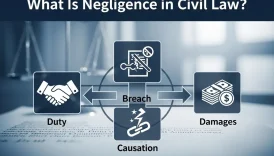What Is Legal Recusal?

In the justice system, fairness and impartiality are fundamental. To protect these principles, judges or other officials sometimes step aside from cases where their involvement could create bias or a conflict of interest. This process is known as recusal.
Simple Definition
Legal recusal is when a judge, justice, or other legal authority removes themselves from a case because of potential bias, conflict of interest, or the appearance of unfairness.
Real-Life Examples
- Personal relationships: A judge recuses from a case involving a close family member.
- Financial interest: A judge withdraws from a lawsuit where they hold stock in one of the parties’ companies.
- Prior involvement: A lawyer who previously worked on a case as counsel cannot later judge it.
- Political bias: A judge steps aside if they previously made public statements about the case.
Importance of the Term
- Protects impartiality: Ensures decisions are made fairly without favoritism.
- Upholds trust: Maintains public confidence in the legal system.
- Prevents conflicts: Stops cases from being influenced by personal interests.
- Supports justice: Ensures both parties receive a fair trial.
Voluntary vs. Mandatory Recusal
| Factor | Voluntary Recusal | Mandatory Recusal |
|---|---|---|
| Initiator | Judge steps aside on their own | Required by law, rules, or higher court |
| Example | Judge feels personal bias | Judge owns financial interest in a party |
| Discretion | Based on judge’s decision | No discretion — legally required |
FAQ
1) Who decides if recusal is necessary?
Sometimes the judge themselves; in other cases, parties may file a motion requesting recusal.
2) Can a judge refuse to recuse themselves?
Yes, unless there is a clear legal requirement. Higher courts can review and enforce recusal.
3) Does recusal mean the case ends?
No. Another qualified judge or authority is assigned to continue the case.
4) Is recusal common in law?
It is relatively rare but essential in cases where impartiality might be questioned.
5) Why is recusal important?
Because it maintains fairness and integrity, ensuring justice is not only done but seen to be done.
Closing
Legal recusal is a safeguard that preserves impartiality in the judicial system. By ensuring judges and officials step aside when conflicts of interest exist, it strengthens trust in the fairness and credibility of legal proceedings.






